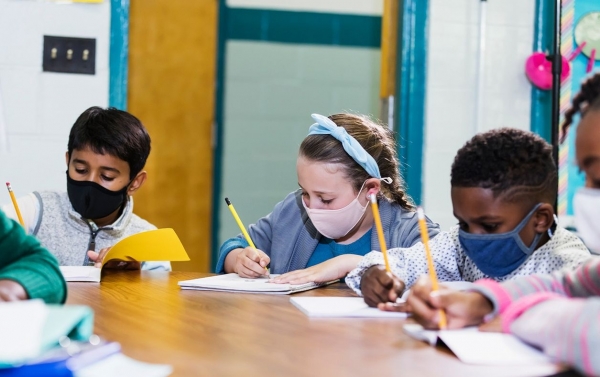In Meriden Public Schools in Connecticut, 77 percent of students are eligible for free and reduced-price meals, and the strains of poverty have increased significantly since the pandemic. As educators, we recognize that meeting the needs of the whole child requires us to start early to avoid having disengaged and disenfranchised students in middle and high school.
In response, Meriden has created a district-wide SEL program across our eight elementary schools.
THE FOUNDATION
Facing a pandemic as well as social unrest, our teachers recognized their own need for social and emotional support and we're looking for creative ways to engage their students in social and emotional learning and character development. Working collaboratively, school leadership identified teacher leaders to be school facilitators and ambassadors for the district’s SEL efforts.
Facilitators were individuals trained in SEL and were sharing with others how they, too, could embed it into their work with students. This was an important first step in personalizing our universal approach because we were able to incorporate our local successes with national SEL competencies and character development traits.
SEL facilitators volunteered to participate in summer planning and development. Formation of the facilitator team led to a district-wide survey, which identified what schoolwide SEL initiatives and programs, if any, were currently in place. Following the review of the survey and identifying the need for consistency of concepts addressed across buildings, a road map of social and emotional learning concepts and character traits was developed by the facilitator team. Our staff was pleased to see that their previous work throughout the years would be providing a foundational component of our district’s universal SEL approach.
THE SCHEDULE
How we use our time demonstrates what we value most, so we created time in the daily schedule at all elementary grade levels for a 20-minute SEL instructional block. In addition, a 15-minute flex block was incorporated into the daily schedule to allow for flexibility throughout the day to address student needs. If a student is exhibiting signs of social or emotional distress, the teacher can pause a lesson, address the need, and then continue without losing instructional time.
Staff training was critical to align schools and support teachers in their own professional development of social and emotional learning. Professional development for all staff was provided during three Covid-19 training and support days. Each Thursday, the district has 45 minutes allocated for professional learning community meetings in each building. As a part of the SEL scope and sequence, a monthly block dedicated to SEL was scheduled during this time. The training was and is developed by staff for their colleagues and students. Rather than purchasing a packaged program or bringing in an outside presenter, we knew that long-term buy-in would be best by utilizing our greatest asset—our own teachers.
Previously we had stellar teachers working in isolation demonstrating how social and emotional learning can transform their classrooms. Now we are creating the systems to ensure that all teachers and students are receiving the support that we know works for students.
THE ROAD MAP
Meriden’s SEL program utilizes established approaches, such as restorative practices or zones of regulation, in combination with daily lessons that have been curated at the district level. All students learn the same concepts at a developmentally appropriate level. Each building follows the district-wide SEL road map to align classrooms and schools. The road map identifies a topic or focus word such as compassion, empathy, and respect that drives social and emotional learning and character development.
This road map is included in a resource center organized by focus word and composed of lessons, videos, book suggestions, extension activities, and quick wins like interactive interest inventories, “Would you rather...?” games, and self-portraits for teachers to ensure ongoing success.
Additionally, we have begun to implement an SEL Buddies program with the understanding that some of the most meaningful learning experiences come from those of classmates and peers. Buddy students, who are selected based on need, are meeting with mentors outside of their designated homeroom and grade level to participate in creative discussions centered around our weekly topics. These mentors are older students. Due to strict cohorting, an adult in the classroom sets up a check-in Google meet for the students. The mentors follow a guided script tied back to the daily lesson. These meetings take place during lunch, recess, and independent work time throughout the week.
THE SUCCESSFUL LEARNER
The new universal SEL program was implemented for both in-person and distance learners on the first day of the 2020–21 school year. Our goal was to reestablish the classroom community upon reentry following Covid-19, as well as to continue helping students develop the skills they need to live happy, healthy, and meaningful lives.
While it’s still early in the implementation process, we have been impressed with student engagement and behavior. We also appreciate our teachers’ positive attitudes during these challenging times and their willingness to embrace change and meet the academic and social and emotional needs of all students. Teachers K–5 start their day engaging in the daily SEL lessons, and they have begun using the strategies to support students throughout the day.
As we progress and expand, teachers across grade levels and throughout the district will collaborate to develop exemplar lessons and contribute to the resource center. This will reinforce alignment and communication throughout the district. While we continue to focus on pandemic planning and subsequent learning loss, Meriden Public Schools is also committed to creating a social and emotional learning structure that supports our students’ development of good character.
By Victoria Ryan







